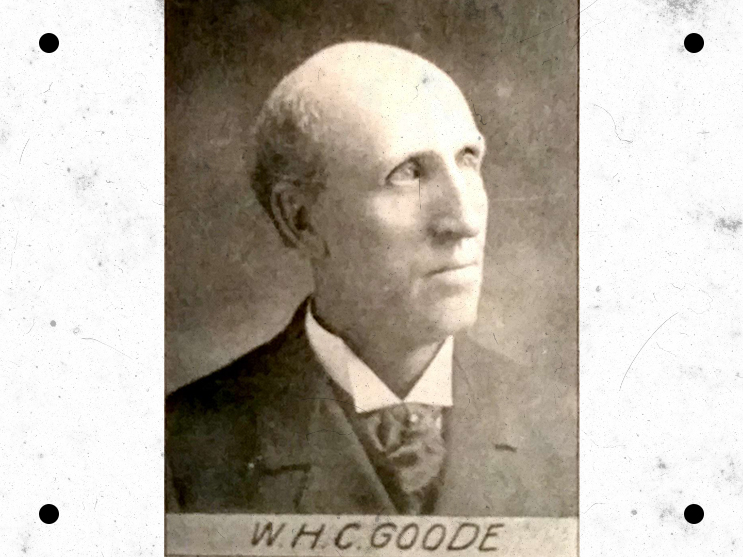William Henry Collier Goode, born in 1843 on a farm northwest of Sidney, was the son of Dr. Henry Goode and his wife Margaret. Starting life in Sidney public schools and working on his family farm, his life seemed typical of many of his era. That is, until his imagination and interest were fueled by the manufacturing opportunities developing in Sidney. From that point on, he separated himself from the average and began a remarkable career.
For that reason, any industrial history of Sidney would be incomplete without the mention of W. H. C. Goode, builder of Whitby Place (now known as Greatstone Castle). Seldom did any civic, industrial or Methodist effort go forward without the contributions of this man. Raised on a farm near Sidney, WHC attended Ohio Wesleyan University then later returned to Sidney, farming on their Clinton township lands with his father and brothers for about six or seven years. By 1876, having interested others in expanding the industrial interests of Sidney, he and some partners founded the American Steel Scraper Company with the plant located on the Miami River in Sidney. This business alone engendered many smaller ones that provided tangential services related to the steel scraper. At this time in Sidney alone, there were three steel scraper companies, all running in competition with each other, and all doing very well shipping their products across the U.S. as well as abroad. Ironically, Mr. Goode’s company was in competition with the Sidney Steel Scraper Company, owned by his wife’s uncle. Later Mr. Goode bought out his associates and ran the business alone until later selling an interest to W.E. Kilborn.
This would only be a small part of his diversified holdings which included many farms throughout Sidney and indeed the entire state. He also owned a 2000-acre wheat farm in North Dakota, a large cattle ranch in Texas on which oil was discovered, and a plantation in Mississippi. Closer to home, he constructed over 50 houses here in Sidney to meet the growing population brought in by the prospects of good-paying jobs in many different industries. Mr. Goode and others like I.H.Thedieck and Mathias Wagner, and other successful businessmen organized the Commercial Club, a group of local leaders who aggressively sought to attract other businesses to Sidney often making loans with their own funds to encourage Sisney’s industrial boom beginning in the 1890s.
Ever mindful of trends and shifts in industry, W.H.C. Goode believed the days of the horse and buggy were soon to end, and so he launched into the “horseless carriage” business by purchasing the assets of the defunct Bimel Buggy Company along with a group of other local investors. While Sidney’s only venture into the automobile industry was rather short lived, it was for a time international. By 1915, almost 300 cars were produced and deliveries made as far away as Cuba. As happened many times, one industry engendered another as the Sidney Manufacturing Company was born that produced bodies for the Bimel Automobile Company. Sadly, the company was tarnished by the fraudulent actions of its general manager Thomas Miller, who eventually was convicted in public trial. Undaunted by this misfortune, Mr. Goode and the other investors moved on to other enterprises designed to help Sidney grow. Eventually the Anderson Body Company would emerge from the ashes and add to Sidney’s industrial heritage for a time.
Like all of the other early industrialists, Mr. Goode cared as much about the growth of Sidney and its moral welfare as he cared about amassing a personal fortune. To that end, he served on the boards of many other organizations, not merely to add to any resume, but rather truly to serve his community, both local and in the broadest sense. He was a devout Methodist, attending church twice every Sunday along with his remarkable wife, Ida Haslup Goode. He also served as president of the official board and held membership in the Knights of Pythias, being a charter member of the Summit Lodge. For more than 20 years he was a trustee of the Ohio Wesleyan University, helping to make that Methodist-related university a well-respected seat of knowledge for generations to come.
His untimely death in 1923 at Whitby Place of a sudden heart attack left the Sidney community without one of its staunchest supporters and one of its greatest industrial entrepreneurs. The life and accomplishments of W.H.C. Goode certainly qualify him as a person of impact.
